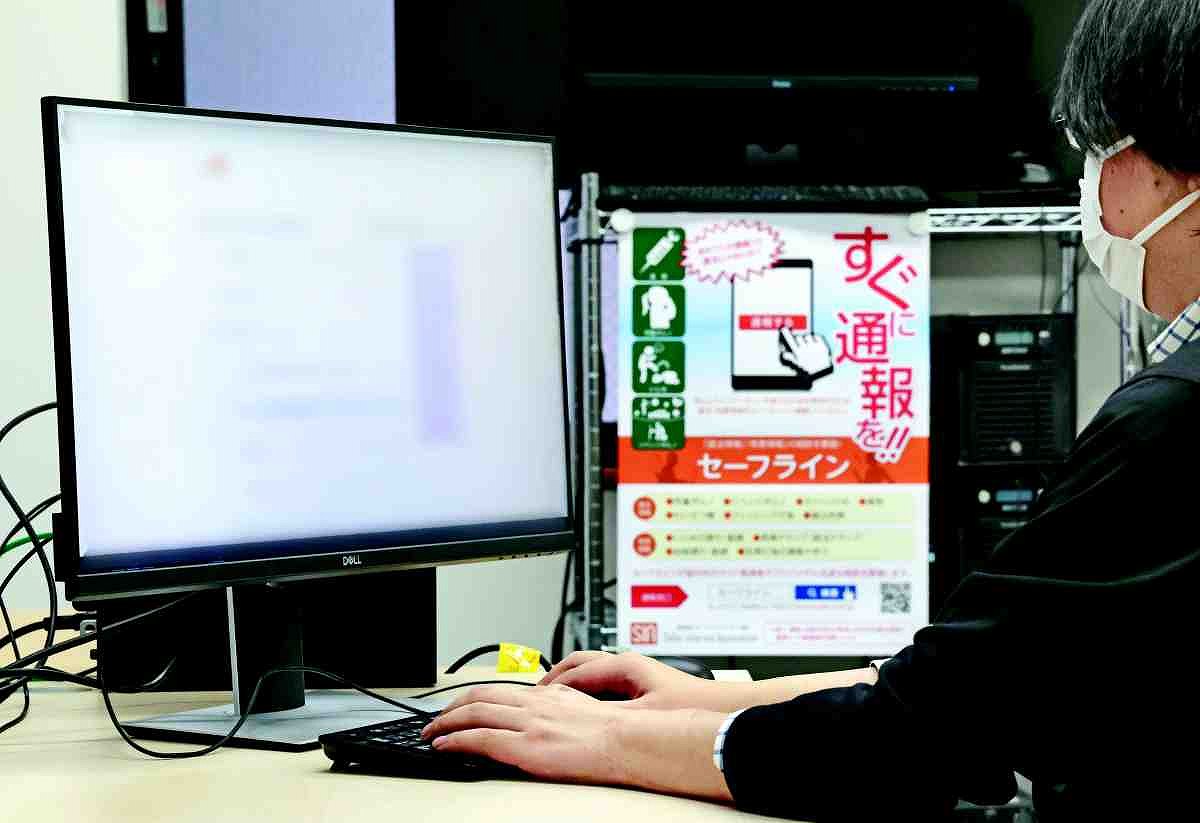
An official of the Safer Internet Association requests the removal of an illegal image on the internet, in this photo taken in Shibuya Ward, Tokyo, in November. (This photo has been partly modified.)
11:29 JST, December 8, 2023
Efforts to combat pornography that victimizes real children are being hindered by the huge amount of apparently AI-generated images that are being posted on domestic websites, according to experts.
Sexual images of children that are created through AI are not covered by the law against child prostitution and child pornography. If such images spread on the internet, it will be difficult to distinguish them from pornography involving living children, which makes it hard to seek their removal from the internet and for police to investigate.
‘Freedom of expression’
“Is this a real child?”
An official at Safer Internet Association (SIA), a Tokyo-based organization comprising platform operators, was perplexed in September as they looked at a sexual image of a child.
The SIA checks online postings related to child pornography, illegal drug trafficking and fraudulent activities, and asks website operators to delete them. It may also reports such postings to the police.
However, there were unnatural elements in the image that the official was looking at. Several staff members concluded that it was most likely created by AI, so the association did not ask the website operator to remove it.
The law prohibits the production and publication of sexual images of people under the age of 18, as well as the possession of such images to satisfy sexual curiosity. However, the images must be of living children for them to be banned. In principle, AI-generated images are not covered by the law.
It may seem reasonable that the offense of distribution of obscene objects under the Penal Code would also cover AI-generated images. However, the requirements are stringent, making it highly likely that the distributors of such images will not be pursued by the police unless the private parts of the body are exposed.
“If we request the removal of AI-generated images with no legal grounds, it could limit freedom of expression. We need to make careful judgments,” said Tatsuya Nakajima, secretary general of the SIA.
However, Nakajima also fears that “if requests to remove images of real children are delayed, they will remain online for a while.”
The same can be said of “blocking,” a process by which one party prevents another from accessing their communication channels. Telecom operators are asked to do this, as overseas websites are expected not to comply with such requests.
An official at the secretariat of the Internet Content Safety Association (ICSA) said, “We have no choice but to assume that when there is uncertainty about guilt, there will be no blocking.”
The possible impact on police investigations is also a matter of concern. According to a senior police official in western Japan, “If sexual images of children generated by AI spread extensively [on the internet], images of real children who are being victimized would be lost among them, which may delay the discovery of harm and the unmasking of such cases.”
‘4,000 images so far’
Numerous sexual images of children that are believed to have been generated by AI have been posted on several domestic websites, many of which are viewed by people abroad.
These images have been subject to legal restrictions in major Western countries, and there are fears that people who look at child pornography in foreign countries have been drawn to domestic sites because of the loose regulations in Japan.
AI image generators can quickly create elaborate images in large quantities, simply by inputting text.
A male office worker in his 50s in the Kanto region said, “I once created more than 1,000 images in a single day.”
Since around May this year, the man has been absorbed in a free image-generating AI tool he learned about online. He has so far posted more than 4,000 sexual images of children alone.
The man said he earns tens of thousands of yen a month from selling such AI-generated images.
When posting the images, he clearly states that they were created with an AI tool.
“It’s a good way to earn some extra income,” the man said.
However, he also said calmly, “If the images are redistributed on the internet, and the fact they were made with AI is concealed, it might be hard to distinguish them from the real thing.”
Machiko Kaida, a professor at Bunkyo Gakuin University who is knowledgeable about the human rights of children, said: “Sexual images of children created by AI will spread the false notion that sexualizing children is no big deal. Discussions must take place about relevant regulations, including revision of the law against child prostitution and child pornography, in line with international standards.”
Top Articles in Society
-

Man Infected with Measles Reportedly Dined at Restaurant in Tokyo Station
-

Man Infected with Measles May Have Come in Contact with Many People in Tokyo, Went to Store, Restaurant Around When Symptoms Emerged
-

Woman with Measles Visited Hospital in Tokyo Multiple Times Before Being Diagnosed with Disease
-

Australian Woman Dies After Mishap on Ski Lift in Nagano Prefecture
-

Foreign Snowboarder in Serious Condition After Hanging in Midair from Chairlift in Nagano Prefecture
JN ACCESS RANKING
-

Japan PM Takaichi’s Cabinet Resigns en Masse
-

Japan Institute to Use Domestic Commercial Optical Lattice Clock to Set Japan Standard Time
-

Israeli Ambassador to Japan Speaks about Japan’s Role in the Reconstruction of Gaza
-

Man Infected with Measles Reportedly Dined at Restaurant in Tokyo Station
-

Videos Plagiarized, Reposted with False Subtitles Claiming ‘Ryukyu Belongs to China’; Anti-China False Information Also Posted in Japan






















